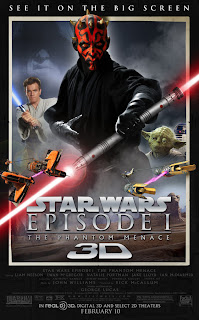MIRACLE ON 34TH STREET
1947
Directed by: George Seaton
Starring: Maureen O'Hara, John Payne, Edmund Gwenn, Gene Lockhart, Natalie Wood
Faith is believing when common sense tells you not to. Don't you see? It's not just Kris that's on trial, it's everything he stands for. It's kindness and joy and love and all the other intangibles.
One of the most warm-hearted films ever made, Miracle on 34th Street depicts the trial of a Macy's store Santa Claus who truly believes he is THE Santa Claus, but at its heart, it's a film about faith. Not just for the other characters, but for the audience itself. When we are first introduced to Kris Kringle, he is walking the streets of New York on Thanksgiving Day. You don't see him with any reindeer, you don't seem him at the North Pole and the only sleigh he rides in is the one in the Macy's Thanksgiving Day parade. Naturally, since he is the hero of the story, there is an implied trust between the protagonist and the viewer. We believe what he presents to us. No matter how ludicrous it may seem. Unlike most movies about Santa Claus, this film has no magic moments. Heck, the most amazing thing Kris does is speak Dutch to a little Dutch orphan. Something certainly anybody with a proper background could do. He brings people together at Christmastime, and slowly convinces every one around him that he is the real deal. Most of this of course is due to the wonderful acting abilities of Edmund Gwenn, who won an Oscar for his portrayal of Kris. "Faith is believing in something when common sense tells you not to." That is a line repeated in the movie... and by the end of the film, we as the audience truly believe that Kris IS Santa, despite having no proof. And there in lies the true miracle of the film.
HANNAH AND HER SISTERS
1986
Directed by: Woody Allen
Starring: Woody Allen, Michael Caine, Mia Farrow, Carrie Fischer, Barbara Hershey, Max Von Sydow, Diane Weist
You know, I was talking to your father before, and I was telling him that it's ironic I, I - used to always have Thanksgiving with Hannah, and I never thought that I could love anybody else. And here it is years later and I'm married to you and completely in love with you.
A 3-story arc that takes place within the span of 1 year, bookended by Thanksgiving Day festivities hosted by Hannah (Mia Farrow) and Elliot (Michael Caine). Much like the Thanksgiving turkey, Hannah serves as the centerpiece of the story, with all other story arcs revolving around her. One of the stories involves Lee (Barbara Hershey), Hannah's sister, becoming involved in an affair with Elliot. Elliot's eye wanders because of his feelings of inadequacy in relation to Hannah's accomplishments and self-sufficiency, while Lee has grown tired of her relationship with the artist Frederick (Max Von Sydow) and leaves him to pursue the affair with Elliot. It's not all serious as Woody Allen plays one of his famously neurotic caricatures, Mickey, a hypochondriac who may actually be facing something seriously life-threatening for a change. His relation to Hannah is through her sister, Holly, with whom he once had a disastrous first date with. Once he is given a clean bill of health, Mickey undergoes a religious and existential crisis... and he bumps into Holly again, this time with a much better results. There are other plots intertwine, but I won't spoil them here. One of Allen's better films.
PLANES, TRAINS AND AUTOMOBILES
1987
Director: John Hughes
Starring: Steve Martin, John Candy
- You shared a motel room with a complete stranger? Are you crazy?
- Not yet. But I'm getting there.
It's two days before Thanksgiving and all advertising executive Neal Page (Steve Martin) wants to do is get home to Chicago in time to cut the turkey. However, it seems fate has a different idea. Page's cab is stolen by the loveably obnoxious Del Griffith (John Candy). But it matters not, because even as they our in mid-flight, the plane gets re-routed to Kansas because of a severe snowstorm. Page ends up crossing paths with Griffith again and again taking (you guessed it) planes, trains and automobiles all in an effort to get home. The formula is pretty standard: a straight-laced uptight businessman paired up with the goofy buffoon in a road trip movie with unsurprising obstacles. But what separates this film from others of its kind is the on-screen chemistry of Martin and Candy. It's surprising the two had never worked on-camera together before this film. Martin's portrayal of the on-the-brink-of-insanity frustrated Page is pitch-perfect, especially combined with Candy's Griffith. John Candy was criminally snubbed by the Academy for a Best Supporting Actor nomination this year. While Candy's comedic chops were at this point already legendary, what made this performance so special was the dramatic chops he brought to a character that could have easily been played as one-dimensional. A classic.









